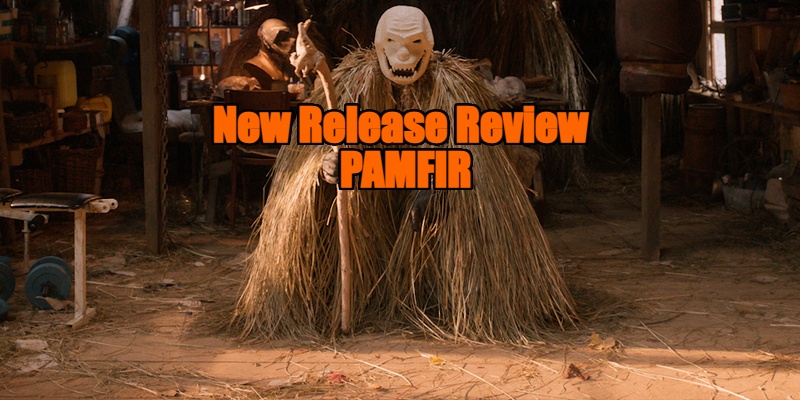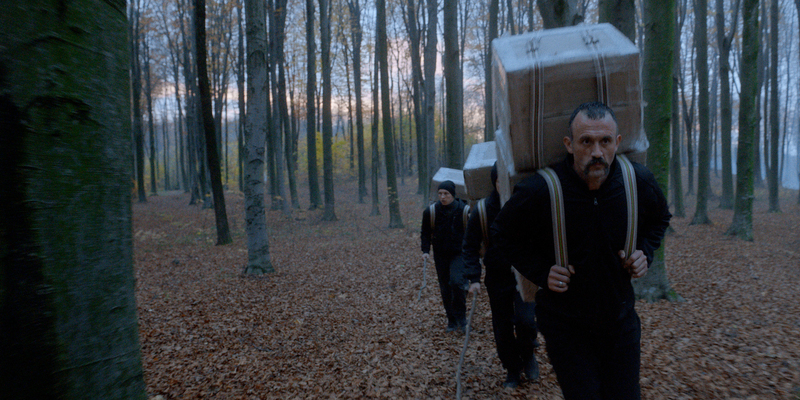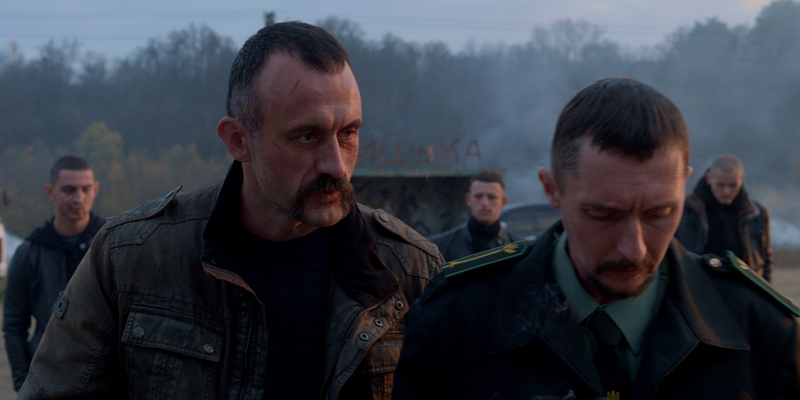
Review by
Eric Hillis
Directed by: Dmytro Sukholytkyy-Sobchuk
Starring: Oleksandr Yatsentyuk, Stanislav Potiak, Solomiya
Kyrylova, Ivan Sharan, Aleksandr Yarema, Olena Khokhlatkina, Rimma
Zyubina

Almost half of Ukraine is rural, a countryside constituted of remote areas
far from the developed towns and cities, wherein the sparse populace forge
a living from the land via traditional means and their rugged physicality.
Dmytro Sukholytkyy-Sobchuk's frankly astounding folk-thriller debut
Pamfir locates its action within the woody, earthy terrains
of such a milieu. It is a hard life in this border town on the edge of the
Carpathians. The weather is unrelenting in its murky coldness, yet the
hearts of the people beat warm.

Pamfir (Oleksandr Yatsentyuk) is a brute, a man seemingly hewn from
the rocks and mountains which surround him. Returning to the village after
a spell working abroad, Pamfir (an epithet derived from Ukranian for
stone) is attempting to put his past as a smuggler - an inevitable
vocation within this deprived and dislocated mob-owned region - behind him
and go straight. After playfully tricking his pre-teen son Nazar (Stanislav Potiak) by hiding in a barn disguised as a monster, Pamfir is reunited with his
wife Olena (Solomiya Kyrylova). They fuck, hard and convincingly,
and once it's over, in a smooth motion Olena instinctively begins clipping
her husband's toenails: that's love. If Mr Tarantino is right in saying
that sex scenes are difficult to shoot, then Sukholytkyy-Sobchuk has
filmed a masterpiece in these few urgent moments, which communicate not
only the genuine love of this family, but also the hunger and imperative
need which characterise their lives.
The opening scenes of Pamfir have the portentous impact of
Heroic verse, yet the shifting subterfuge of the filmmaking hints at
darker developments to come. Winding up Nazar, Pamfir dresses in an
impressively constructed costume of flared straw and an outsize paper
mâché skull, fashioned in preparation for the Malanka festival. The
celebration is an abiding pre-Christian holdover which involves the men,
only the men, of the village dressing up as animals and gods (I think
Pamfir is going as Veles at the start: Ivan Mikhailov's excellent
production design inspired further investigation of this colourful
procession), in order to ward off any evil the forthcoming year may hold.
Some hope. Throughout the film, Mykyta Kuzmenko's camera is
furtive; restless, spying, showing us characters in reflection or obtuse
angles. We are complicit in the forces that will come to shape the fates
of Pamfir, Olena and Nazar despite their costumed rituals.

Pamfir exists within the demands of circumstance. He can only stay home
for the Malanka period before soon leaving town again to dig wells in
Poland. Nazar, dizzy with boyish adoration for his father yet limited by a
homely understanding of the world, designs to set fire to his dad's work
papers so the patriarch is forced to stay. Problem is that in doing so he
only goes and accidentally burns the town church down which is owned by
the local Odesa. This means that Pamfir is inexorably drawn in for one
last job, a thriller dynamic made fresh and original by the film's novel
context and the filmmaking's searing vigour. There is a ragbag crew,
dashes through snow laden forest filmed in fluid tracking shots, and
painful, affecting violence.
Yatsentyuk is superlative, his Pamfir a man struggling not so much against
the mob and the consequences of illegality, but his own dignity and need
to protect his family. That said, a standout scene features the man of
rock physically taking on a large gang of heavies and almost winning in a
swirling, unbroken medium shot of sheer genre excitement. A telling and
heart-breaking moment comes later wherein Olena admits that she has
"nothing": Pamfir at least has his masculine power, a strength which also
yet functions as a curse. The atavistic setting of
Pamfir enables Sukholytkyy-Sobchuk to examine masculinity
and all its lumbering responsibilities, an ineludible framework where
traditional gender roles are pervasively essential.

And with all that, there are moments of tenderness and keen humour... to
keep them sharp during their night-time border hopping, Pamfir and his
lads take a steroid which ultimately makes them priapic, leading to a
comedy montage of self-relief (men wanking is somehow always ridiculous
and funny). There are parallels to be drawn between the hand to mouth
existence of Pamfir's denizens and the tenacity of its grant funded, low budgeted
filmmakers, just as it is perhaps irresistible to conflate the micro of
Pamfir's beleaguered position with Ukraine's unstable macrocosm. Such
readings exist, but the pagan energy of Pamfir transcends
its conditional contexts and, in its final scenes especially, becomes a
universal treatise on what it means to be a man.

Pamfir is in UK/ROI cinemas from
May 5th.

